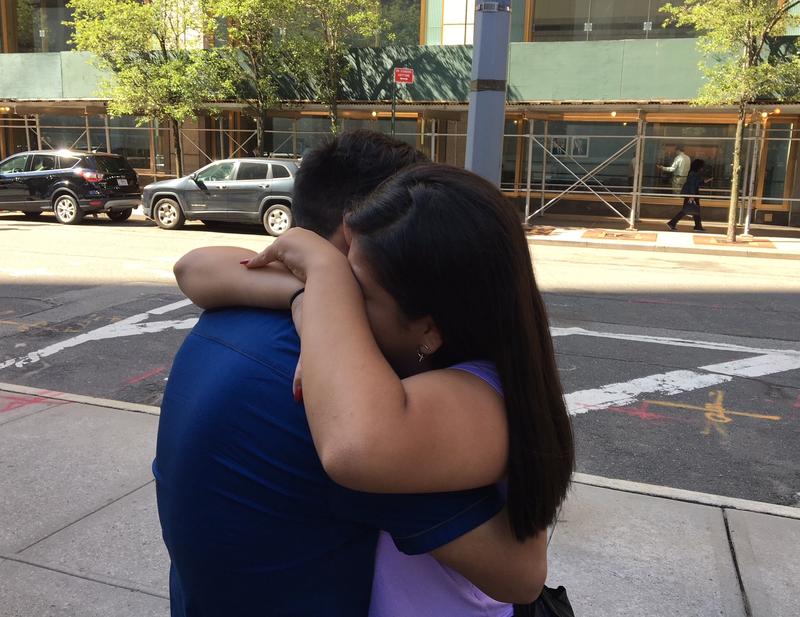
It took her 32 hours to drive from Houston to New York City. But 40 year-old Carina said she just had to be there for her teenage cousin's hearing in immigration court in Manhattan in June. He didn't have a lawyer and he was fighting the government's attempt to deport him back to El Salvador.
"It is so depressing, he would never make it over there anymore," she said, referring to the gang violence and prevalence of guns. "It’s like you go out of your house, you know you’re going out but you don’t know if you’re going to come back."
Carina's 17-year-old cousin was scared to talk, and so was she — which is why neither would give their real names. She said the boy fled El Salvador months earlier to join relatives on Long Island.
There is no guaranteed right to representation in immigration court, even for children. Without legal representation, immigrants have a difficult time obtaining legal status.
Legal service providers in New York formed a local coalition in 2014 to help the surge in young Central Americans who wound here after crossing the border alone, or with relatives other than their parents. As a result, about 80 percent of unaccompanied minors at New York's immigration court had lawyers in fiscal years 2014-2016, according to data analyzed by TRAC at Syracuse University.
But in fiscal year 2017, only 58 percent of unaccompanied minors in New York were represented. The percentage dropped even more this year, now that the government includes children separated from their parents at the U.S. border, making accurate comparisons very difficult.
Advocates said there are several reasons for the pronounced drop in 2017, which WNYC also documented in New Jersey. The Trump Administration's sweeping changes in immigration policy now make it harder to get asylum and other protections. This means immigration lawyers can't take as many new clients because they're working longer hours on their existing cases.
"You would have been able to close out a case and get it to resolution within a year or two years" before the changes, said Elisa Gahng, the pro bono coordinating attorney at Kids in Need of Defense's New York office. But now, she said, cases require more time.
Children are especially dependent on free lawyers because they're less likely than adults to afford a private attorney. Gahng and her staff mentor the pro bono lawyers who want to help unaccompanied minors. She said they can screen anyone who calls to figure out what they need, but can't guarantee them a lawyer.
The Mayor's Office for Immigrant Affairs said the city's committed an unprecedented $40 million for legal services for immigrants. But it takes time to train new attorneys and the need is constant.
Gahng said another factor has made it more difficult to serve unaccompanied minors. Until last year, they were all assigned to specific judges on certain days each month at immigration court, in 26 Federal Plaza. Legal service providers had a room they could use on those days to meet with the minors in person, and inform them about their rights.
"They were able to go see the judge educated," said Gahng, "understanding why they were there, what their possibility for relief was and even to be able to say I have an attorney."
Last year, the New York immigration court took away the room because it needed the space for more courtrooms. A spokesman said this was planned long ago but that the Department of Justice, which runs the courts, is still willing to talk about alternatives. For now, the lawyers hand out informational fliers in the hallways.
But the kids pop up on other days, too. Carina's cousin seemed to be the only minor when he attended a master calendar session, which is when immigrants make their first formal appearance in court.
When minors and adults don't have a lawyer at their first court appearance, judges typically ask them to come back in a few months and hand them a list of legal service providers. Gahng said that can be overwhelming for young people who have already endured trauma and have just entered a new country where they don't speak the language.
"They may get discouraged and they may just stop showing up to their future hearings," she said.
Eighteen year-old Melvin was scared to go to court, fearing he might get deported. He said he fled Guatemala because of the gangs in his town, and is staying with an uncle now in Brooklyn. Melvin isn't his real name; he asked us to use it because he didn’t want to be identified.
Melvin was one of dozens of unaccompanied minors appearing before the same judge at the end of June. Most didn't have attorneys. As he left the Federal Building, he saw someone he knew: a 17 year-old girl he'd met in a detention center in Texas months ago, after crossing the border.
"I’m so happy to see you," she told him, as she broke out laughing. She said he name is Brianna and that she's also from Guatemala. She’s now living with her mom, who moved to Long Island years ago.
Brianna also went to immigration court that day, but she was joined by her mother’s lawyer. She wished Melvin good luck and gave him a long hug.
When Melvin left court that day, he had a list of free legal service providers that attorneys, including Gahng, had passed around in the hallway. But as of last week, he said the ones he called were too busy, so he’s going with a private lawyer. He said it would cost him $4500. His next court date is at the end of September.
With translation help from Monica Cordero.
